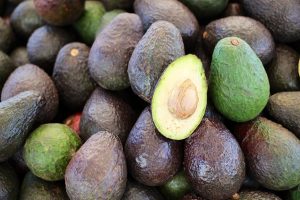It seems like avocado is the mascot of the keto diet, whether it’s in logos, the majority of keto recipes, or as the preferred fruit for the way the keto diet works. Along with kale, it’s intriguing how the fruit has grown a pop cult following, especially since the early 2000’s, avocado imports grew over 20% between 2012 and 2016, and in 2016 global imports made $4.82 billion dollars. Whether you love avocado toast (with Keto-friendly bread, that is) or you think it’s an overrated millennial hype, here’s a few tidbits on the fruit of guacamole:
- Great source of fat, the good fat: The keto diet is about ketosis of fats, but not all fats are created equal. Between all the dietary controversy, it’s still clear that unsaturated fats are preferable and recommended over saturated fats. Unsaturated fats are better for the cardiovascular system and anti-inflammatory. Avocados include a high amount of monounsaturated fatty acids.
- High on fiber: Fiber is incredibly helpful for the digestive tract, and when calculating net carbs for the keto diet, most people count “net carbs”, which discounts fiber since the human GI tract doesn’t digest it. For an estimate, one avocado contains about 14 grams of fiber.
- Low on carbohydrates: Since much of the carbohydrate count of an avocado is fiber, one avocado contains approximately 4 grams of net carbohydrates. Since the keto diet is aiming to minimize carbohydrate intake to train the body to utilize fats, this is an optimal low carb fruit.
- Contains lots of vitamins, especially vitamin B: Avocado is known to contain vitamin K, E, C, and lots of Vitamin B (B1, B2, B3, B5, B6, and B9 or folate). Notably, the B vitamins are water-soluble vitamins that have a significant role in cell metabolism, and vitamin K is a fat-soluble vitamin that helps with calcium binding, blood coagulation, and protein synthesis.
- Contains essential minerals (aka electrolytes): Avocados contain potassium, copper, zinc, iron, manganese, and magnesium. Out of the 16 essential minerals, that’s a pretty good record, as minerals play a crucial role in homeostatic processes, such as blood pressure, water and electrolyte balance, and the skeletal structure. As a fun side note, when people talk about electrolytes, they’re referring to an umbrella term for any particle with an electrical charge, which refers to the essential minerals when discussing nutrition because minerals form electrolytes for metabolism.
- Rich in antioxidants: Lastly, avocados’ rich level of antioxidants help protect against free radicals, which occur because of oxidation. This protects against cell damage.
Overall, the avocado isn’t hyped up for nothing – it’s both incredibly great for your overall health and tastes delicious (especially with EBTB seasoning from Trader Joe’s, lemon black pepper, or a combo of sea salt, black pepper, and za’atar)!

